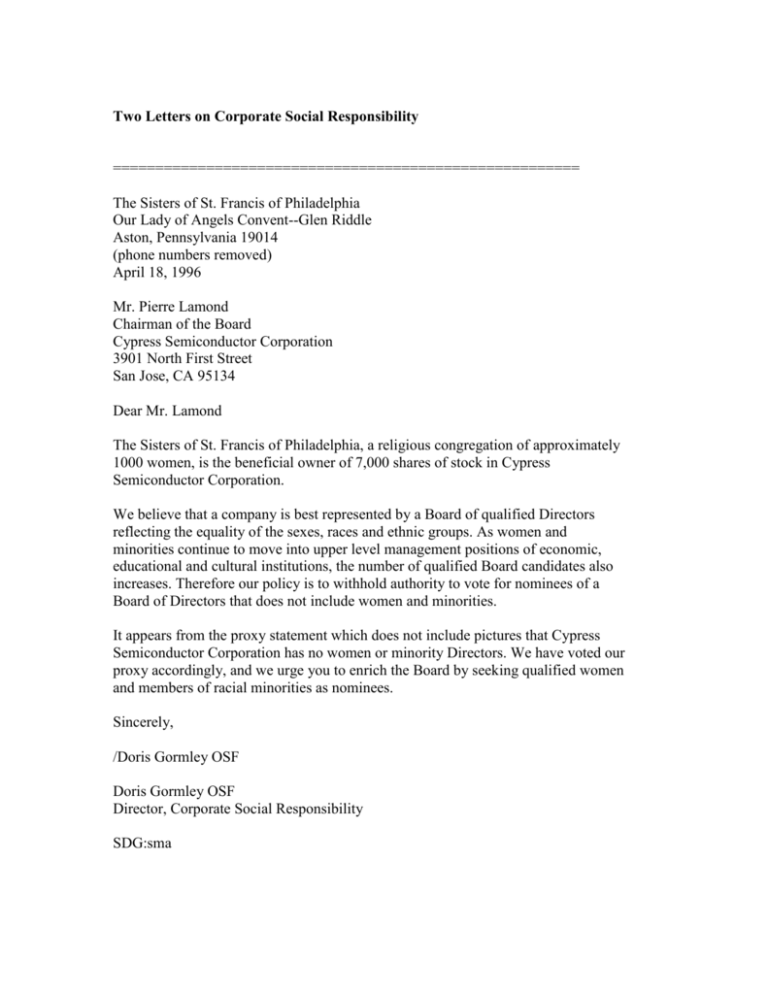Letter TJ Rogers Cypress semiconductor
advertisement

Two Letters on Corporate Social Responsibility ======================================================= The Sisters of St. Francis of Philadelphia Our Lady of Angels Convent--Glen Riddle Aston, Pennsylvania 19014 (phone numbers removed) April 18, 1996 Mr. Pierre Lamond Chairman of the Board Cypress Semiconductor Corporation 3901 North First Street San Jose, CA 95134 Dear Mr. Lamond The Sisters of St. Francis of Philadelphia, a religious congregation of approximately 1000 women, is the beneficial owner of 7,000 shares of stock in Cypress Semiconductor Corporation. We believe that a company is best represented by a Board of qualified Directors reflecting the equality of the sexes, races and ethnic groups. As women and minorities continue to move into upper level management positions of economic, educational and cultural institutions, the number of qualified Board candidates also increases. Therefore our policy is to withhold authority to vote for nominees of a Board of Directors that does not include women and minorities. It appears from the proxy statement which does not include pictures that Cypress Semiconductor Corporation has no women or minority Directors. We have voted our proxy accordingly, and we urge you to enrich the Board by seeking qualified women and members of racial minorities as nominees. Sincerely, /Doris Gormley OSF Doris Gormley OSF Director, Corporate Social Responsibility SDG:sma ============================================================= May 23, 1996 Doris Gormley, OSF Director, Corporate Social Responsibility The Sisters of St. Francis of Philadelphia Our Lady of Angels Convent--Glen Riddle Aston, PA 19014 Dear Sister Gormley: Thank you for your letter criticizing the lack of racial and gender diversity of Cypress's Board of Directors. I received the same letter from you last year. I will reiterate the management arguments opposing your position. Then I will provide the philosophical basis behind our rejection of the operating principles espoused in your letter, which we believe to be not only unsound, but even immoral, by a definition of that term I will present. The semiconductor business is a tough one with significant competition from the Japanese, Taiwanese, and Koreans. There have been more corporate casualties than survivors. For the reason, our Board of Directors is not a ceremonial watchdog, but a critical management function. The essential criteria for Cypress board membership are as follows: * Experience as a CEO of an important technology company. * Direct expertise in the semiconductor business based on education and management experience. * Direct experience in the management of a company that buys from the semiconductor industry. A search based on these criteria usually yields a male who is 50-plus years old, has a Masters degree in an engineering science, and has moved up the managerial ladder to the top spot in one or more corporations. Unfortunately, there are currently few minorities and almost no women who chose to be engineering graduate students 30 years ago. (That picture will be dramatically different in 10 years, due to the greater diversification of graduate students in the '80s.) Bluntly stated, a "woman's view" on how to run our semiconductor company does not help us, unless that woman has an advanced technical degree and experience as a CEO. I do realize there are other industries in which the last statement does not hold true. We would quickly embrace the opportunity to include any woman or minority person who could help us as a director, because we pursue talent--and we don't care in what package that talent comes. I believe that placing arbitrary racial or gender quotas on corporate boards is fundamentally wrong. Therefore, not only does Cypress not meet your requirements for boardroom diversification, but we are unlikely to, because it is very difficult to find qualified directors, let alone directors that also meet investors' racial and gender preferences. I infer that your concept of corporate "morality" contains in it the requirement to appoint a Board of Directors with, in your words, "equality of sexes, races, and ethnic groups." I am unaware of any Christian requirements for corporate boards; your views seem more accurately described as "politically correct," than "Christian." My views aside, your requirements are--in effect--immoral. By "immoral," I mean "causing harm to people," a fundamental wrong. Here's why: * I presume you believe your organization does good work and that the people who spend their careers in its service deserve to retire with the necessities of life assured. If your investment in Cypress is intended for that purpose, I can tell you that each of the retired Sisters of St. Francis would suffer if I were forced to run Cypress on anything but a profit-making basis. The retirement plans of thousands of other people also depend on Cypress stock--$1.2 billion worth of stock--owned directly by investors or through mutual funds, pension funds, 401k programs, and insurance companies. Any choice I would make to jeopardize retirees and other investors from achieving their lifetime goals would be fundamentally wrong. * Consider charitable donations. When the U.S. economy shrinks, the dollars available to charity shrink faster, including those dollars earmarked for the Sisters of St. Francis. If all companies in the U.S. were forced to operate according to some arbitrary social agenda, rather than for profit, all American companies would operate at a disadvantage to their foreign competitors, all Americans would become less well off (some laid off), and charitable giving would decline precipitously. Making Americans poorer and reducing charitable giving in order to force companies to follow an arbitrary social agenda is fundamentally wrong. * A final point with which you will undoubtedly disagree: Electing people to corporate boards based on racial preferences is demeaning to the very board members placed under such conditions, and unfair to people who are qualified. A prominent friend of mine hired a partner who is a brilliant, black Ph.D. from Berkeley. The woman is constantly insulted by being asked if she got her job because of preferences; the system that creates that institutionalized insult is fundamentally wrong. Finally, you ought to get down from your moral high horse. Your form letter signed with a stamped signature does not allow for the possibility that a CEO could run a company morally and disagree with your position. You have voted against me and the other directors of the company, which is your right as a shareholder. But here is a synopsis of what you voted against: * Employee ownership. Every employee of Cypress is a shareholder and every employee of Cypress--including the lowest-paid--receives new Cypress stock options every year, a policy that sets us apart even from other Silicon Valley companies. * Excellent pay. Our employees in San Jose averaged $78,741 in salary and benefits in 1995. (That figure excludes my salary and that of Cypress's vice presidents; it's what "the workers" really get.) * A significant boost to our economy. In 1995, our company paid out $150 million to its employees. That money did a lot of good: it bought a lot of houses, cars, movie tickets, eyeglasses, and college educations. * A flexible health-care program. A Cypress-paid health-care budget is granted to all employees to secure the health-care options they want, including medical, dental, and eye-care, as well as different life insurance policies. * Personal computers. Cypress pays for half of home computers (up to $1,200) for all employees. * Employee education. We pay for our employees to go back to school, and we offer dozens of internal courses. * Paid time off. In addition to vacation and holidays, each Cypress employee can schedule paid time off for personal reasons. * Profit sharing. Cypress shares its profits with its employees. In 1995, profit sharing added up to $5,000 per employee, given in equal shares, regardless of rank or salary. That was a 22% bonus for an employee earning $22,932 per year, the taxable salary of our lowest-paid San Jose employee. * Charitable Work. Cypress supports Silicon Valley. We support the Second Harvest Food Bank (food for the poor), the largest food bank in the United States. I was chairman of the 1993 food drive, and Cypress has won the food-giving title three years running. (Last year, we were credited with 354,131 pounds of food, or 454 pounds per employee, a record.) We also give to the Valley Medical Center, our Santa Clara-based public hospital, which accepts all patients without a "VISA check." Those are some of the policies of the Board of Directors you voted against. I believe you should support management teams that hold our values and have the courage to put them into practice. So, that's my reply. Choosing a Board of Directors based on race and gender is a lousy way to run a company. Cypress will never do it. Furthermore, we will never be pressured into it, because bowing to well-meaning, special-interest groups is an immoral way to run a company, given all the people it would hurt. We simply cannot allow arbitrary rules to be forced on us by organizations that lack business expertise. I would rather be labeled as a person who is unkind to religious groups than as a coward who harms his employees and investors by mindlessly following high-sounding, but false, standards of right and wrong. In conclusion, please consider these two points: First, Cypress is run under a set of carefully considered moral principles, which rightly include making a profit as a primary objective. Second, there is a fundamental difference between your organization's right to vote its conscience and the use of coercion by the federal government to force arbitrary "corporate responsibilities" on America's businesses and shareholders. Cypress stands for personal and economic freedom, for free minds and free markets, a position irrevocably in opposition to the immoral attempt by coercive utopians to mandate even more government control over America's economy. With regard to our shareholders who exercise their right to vote according to a social agenda, we suggest that they reconsider whether or not their strategy will do net good--after all of the real costs are considered. Sincerely, /T.J. Rodgers T.J. Rodgers President CEO TJR/cxs (This text has been slightly abbreviated, but the content is unchanged.) ========================================================== Debate question: With whom would you side in this dispute and why? Obviously President Rogers put a lot of thought into his response, but are reasons appropriate and reasonable? Are the "essential criteria for Cypress board membership" given appropriate for a corporation such as Cypress (or even any other large corporation in this business)? Would it make a difference if this were a corporation is some less technologically based product?











